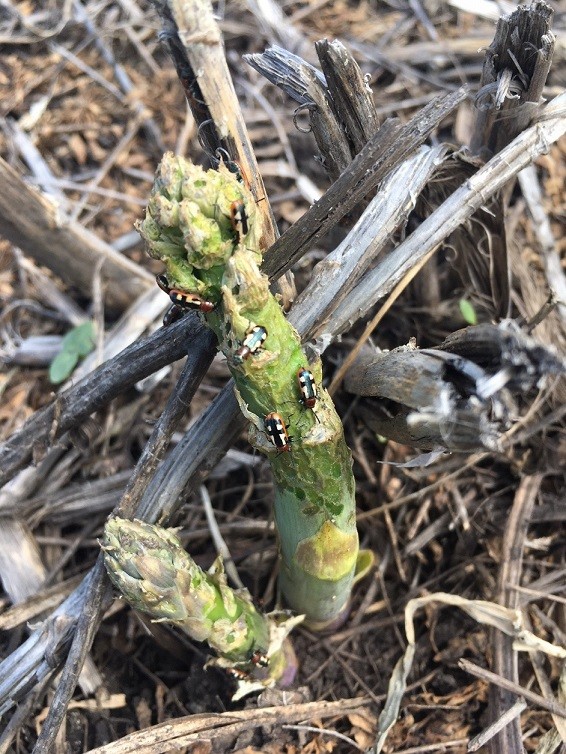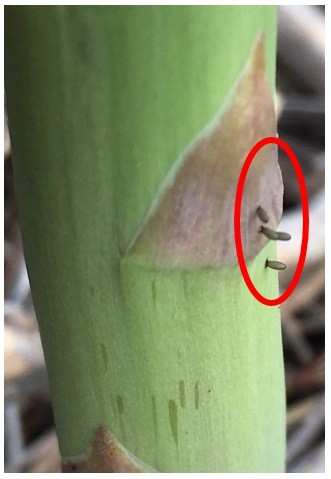Common Asparagus Beetle Management During Harvest Season
Ethan Grundberg, Vegetable Specialist
Eastern New York Commercial Horticulture
The beginning stages of Common asparagus beetle (Crioceris asparagiI) infestations often go unnoticed. Since the beetles have two to three generations per year (depending upon where you are in our region), the population can build quickly over the course of a couple of years and catch growers off-guard at harvest.
Overwintered adults emerge from their pupae about the same time that asparagus spears begin to push. They quickly begin to feed on the tender shoots causing a sort of rasping damage that browns quickly in the field or post-harvest. The beetles then mate and deposit their eggs in vertical lines along the spears as shown in the image. After about a week, those eggs hatch into small grubs that continue to feed on spears before pupating in the soil.
Though the larvae, not adults, are most susceptible to insecticides, growers experiencing significant early damage (the economic threshold is suggested to be when 5%-10% of spears have adults present) may need to use an insecticide to knock down the adults before targeting larvae and later generations on ferns. Given the need to continue harvesting every 1-2 days (a practice that also helps remove eggs from the field to slow the population growth), a short Pre-Harvest Interval (PHI) and Restricted Entry Interval (REI) are key to selecting an appropriate labeled insecticide.
The standard insecticide options are pyrethroids (IRAC Group 3A), such as Pounce 25 WP and other labeled permethrin formulations (1 day PHI, 12 hour REI) or PyGanic 5.0 (OMRI, 0 day PHI, 12 hour REI). Some neonicitnoids (IRAC Group 4A), such as Assail 70 WP and Anarchy 30 SG (both acetamiprid), are also labeled for asparagus beetle adults and larvae during harvest (1 day PHI, 12 hour REI). Lannate (methomyl, IRAC Group 1A), is also options if you are willing to equip the harvest crew with early entry PPE (1 day PHI, 48 hour REI) to continue removing egg masses on cut spears. An easier option for those looking to use an organophosphate is Sevin XLR Plus (carbaryl, 1 day PHI, 12 hour REI). Note that Lorsban (chlorpyrifos) is sometimes recommended in other states, but IS NOT allowed for use on asparagus in New York.
For heavily infested fields, continue scouting the asparagus after harvest and target second and/or third generations with any of the options listed above or with IRAC Group 5 spinosyns, such as Radiant or Entrust (OMRI), both of which have a 60 day PHI. Cleaning fields of old stalks after mowing in the fall can also help reduce the overwintering populations.
 1. Common asparagus beetle adults feeding on an emerging spear
1. Common asparagus beetle adults feeding on an emerging spear 2. Grayish colored asparagus beetle eggs visible in a vertical line on a young spear
2. Grayish colored asparagus beetle eggs visible in a vertical line on a young spear
Upcoming Events
2026 Northeast Extension Fruit Consortium Winter Webinar Series
February 4, 2026 : Management of Up and Coming Strawberry Diseases in the Northeastern United States
Session 1: Management of Up and Coming Strawberry Diseases in the Northeastern United States
February 11, 2026 : Kiwiberry Production in the Northeast
Session 2: Kiwiberry Production in the Northeast
February 18, 2026 : Heat Mitigation- Sunburn and Fruit Coloring
Session 3: Heat Mitigation- Sunburn and Fruit Coloring
February 25, 2026 : The Dating Game- Updates in Lepidopteran Mating Disruption
Session 4: The Dating Game- Updates in Lepidopteran Mating Disruption
March 4, 2026 : USEPA Endangered Species Act Strategies and Pesticide Use
Session 5: USEPA Endangered Species Act Strategies and Pesticide Use
March 11, 2026 : Practical Drought Management for Fruit Growers
Session 6: Practical Drought Management for Fruit Growers
2026 Cornell Winter Fruit Webinar Series
January 22, 2026 : Blueberry Pruning and Soil Health to Minimize Pests and Maximize Yield
Week 1: Blueberry Pruning and Soil Health to Minimize Pests and Maximize Yield
January 29, 2026 : Cost of Production for Fruit Crops
Week 2: Cost of Production for Fruit Crops - A new tool for tree fruit, updates on berry production in NY, and strategies for tracking and using expense data
February 12, 2026 : Fire Blight Management Updates
Week 3: Fire Blight Management Updates - Pathogen Biology, Defense Inducers, Biopesticides, and Pruning Therapies
February 19, 2026 : Pink and Petal Fall Insecticides- Can We Strike the Right Balance?
Week 4: Pink and Petal Fall Insecticides - Can We Strike the Right Balance?
March 12, 2026 : Inoculating Orchards with Mycorrhizal Fungi
Week 5: Inoculating Orchards with Mycorrhizal Fungi
March 19, 2026 : St. Peachtrick's Day - Cherry Pruning Strategies and Plum Varieties for the Northeast
Week 6: St. Peachtrick's Day - Cherry Pruning Strategies and Plum Varieties for the Northeast
How to Diversify or Scale Up with Confidence for Profitability - Inspired by Annie's Project
February 4, 2026
February 11, 2026
February 25, 2026
Do you have an idea for a new enterprise to add value to your farm? Maybe you're considering scaling up for a potential market opportunity but just aren't sure if it's a good fit for your business. Join Cornell Cooperative Extensions of Allegany County, Broome County, Madison County, Onondaga County, Niagara County, Tioga County, the Niagara Small Business Development Center, and the Eastern NY Commercial Horticulture Team for a hybrid series on Wednesdays in February, starting on February 4th that will answer these questions and more. Annie's Project seeks to empower farm women through education, networks and resources. We welcome, and encourage, learning and sharing amongst farm women as we help you grow as decision-makers and leaders on your farm.












































